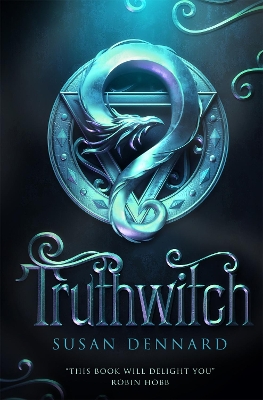
The first in the New York Times bestselling Witchlands series, Truthwitch by Susan Dennard is a brilliantly imagined coming-of-age story. It's perfect for fans of Robin Hobb, Victoria Aveyard and Trudi Canavan.
‘Truthwitch by Susan Dennard is like a cake stuffed full of your favourite fantasy treats . . . this book will delight you’ – Robin Hobb, author of Assassin’s Apprentice
In a continent on the edge of war, two witches hold its fate in their hands
Young witches Safiya and Iseult have a habit of finding trouble. After clashing with a powerful Guildmaster and his ruthless Bloodwitch bodyguard, the friends are forced to flee their home.
Safi must avoid capture at all costs as she's a rare Truthwitch, able to discern truth from lies. Many would kill for her magic, so Safi must keep it hidden – lest she be used in the struggle between empires. And Iseult's true powers are hidden even from herself.
In a chance encounter at Court, Safi meets Prince Merik and makes him a reluctant ally. However, his help may not slow down the Bloodwitch now hot on the girls' heels. All Safi and Iseult want is their freedom, but danger lies ahead. With war coming, treaties breaking and a magical contagion sweeping the land, the friends will have to fight emperors and mercenaries alike. For some will stop at nothing to get their hands on a Truthwitch.
Continue the bestselling fantasy adventure with Windwitch by Susan Dennard.
- ISBN10 144728206X
- ISBN13 9781447282068
- Publish Date 12 January 2017 (first published 5 January 2016)
- Publish Status Active
- Out of Print 5 March 2024
- Publish Country GB
- Publisher Pan Macmillan
- Imprint Tor
- Format Paperback (B-Format (198x129 mm))
- Pages 496
- Language English
Reviews


nora
The strong female friendship is supposed to be the big selling point for this book, but I didn't enjoy the way it was handled. I wish there were more scenes with them interacting as friends, because at this point it seems very superficial. It basically boils down to each of them saying over and over that they would die for each other. They have surprisingly few scenes together, and none that show what's special about their friendship. Iseult (kind of) saved Safi's life when they were kids, but then what? What do they even like about each other or have in common??
Iseult has the most interesting character and backstory, but her viewpoint is absent for chunks of the book, so that sucks. She's also repeatedly described as analytical and "a planner", but she's not given time to be either of those. Safi is just not as cool, and she constantly ruins the plans of anyone who tries to help her.
I also don't understand shit about the worldbuilding, which consists of the book referencing things without explanation and me pretending I understand. Why isn't Iseult allowed to have emotions? What is a threadwitch supposed to do? What are the threads that build and the threads that bind and whatever other thready thing they do? Why are these countries going to war just because the truce is up? What are they fighting for and what did they expect would happen when the truce was over? Like what was the goal of the truce? What language are they even speaking and why are there never language barriers with so many countries involved? What is the Cahr Awen even supposed to be? Why does everyone want Safi for her power when her power is so fucking useless?
Also the contract about Safi spilling blood, the only thing on my mind was what if she has her period. Bet neither of the dudes who signed it even considered that...

vagasker

Joni Reads

Renee
It started out great. I loved the first 25% of the book, but then it became painfully obvious how underdeveloped everything was. There was no character development, there was no well developed friendships, the romance was extremely rushed (and cringy), and the worldbuilding was nonexistent.

Kate (Blogging with Dragons)
“If Safi’s magic ever became public knowledge, she would be used as a political tool … Or eliminated as a political threat. Safi’s power was that valuable and rare. Which was why, for Safi’s entire life, she’d kept her magic secret. Like Iseult, she was a heretic: an unregistered witch.”
Readers are thrust into Truthwitch’s world of witchery without much explanation. The author, Susan Dennard, assumes the reader is smart enough to pick up on what “Threads” are and how they play into the world and that of its main characters, Threadsisters Safiya “Safi” Fon Hesstrel and Iseult Det Midenzi. Both Safi and Iseult are unlike other witches. Safi is the first Truthwitch born in a century. The ability to tell truths from a lie puts her and everything she holds dear in extreme danger--for people would love to utilize her power for their own means. Her power and noble title of Domna makes her especially desirable to those in power, like government rulers.
“She was the natural tactician, while Safi was the one with the first sparks of an idea.”
Safi’s Threadsister, Iseult also has her own type of magical vision with which to deal--she is a Threadwitch--and possibly something more. She can not only see the Threads of life in everything around her, but also the colors of them, revealing the emotions of their beholder--whether Iseult likes it or not. And it’s not just Iseult’s bond with Safi, or her witchery that sets her apart--Iseult also has to deal with the constant racism due to being a Nomatsi. All of these facets of the girls adds so much depth and character to their bond, which is the standout part of the novel. I loved that author Dennard wrote the novel from both girl's perspectives, something that allowed the readers to get to know and love both Threadsisters equally and prevented either one of them from becoming a flat sidekick.
And to top it off, when the girls find themselves in a literal world of trouble, they aren’t damsels in distress. They are educated, can speak multiple languages, witty, can also fight--with Safi weilding a sword and Iseult brandishing lethal Moon Scythes--and of course, have their rare Witchery at their disposal.
“Thread-bonds are unbreakable--and you know that better than anyone else. The day that you saved Safi’s life six years ago, you and she were bound together as Threadsisters. To this day, you would die for Safi, just as she would die for you.”
I was immediately floored by Safi and Iseult’s bond--every person reading Truthwitch will wish they had their own Threadsister or Threadbrother. The two are only at their best when they are together, with Safi’s confidence and impulsiveness, and Iseult’s logic and calm evening each other out. It was thrilling to read about not just one strong female character, but two. Plus, I think a lot of female-female friendships are usually stereotyped by jealousy and cattiness, or passed up for romantic female-male love, so it was a breath of fresh air to see only love and support in these two female characters. I loved that when romantic love with males entered the picture in the form of Prince Merik Nihar and Bloodwitch assassin Aeduan, it does not diminish the relationship of the girls in any way--they are still each other’s priority--something that is rarely seen in any novels I have read.
“She had her Threadsister beside her. That was all that mattered--all that had ever mattered.”
Unlike the amazing female friendship of Truthwitch, I did find the romances of the novel to be a little problematic. After all, Safi’s love interest--the Prince of Nubreven and Admiral of its Navy--Merk, is known as “The Fury” due to his wild temper. At one point, he physically chains Safi to his ship, rain and all, as punishment for not following his orders and putting his crew in danger. I did not find the novel’s repeated assurances that Merik’s actions were just and done only as a means to keep order on his or that Safi had earned this punishment with her actions, at all convincing. To me, it reeked of normalized toxic masculinity. I also found it hard to believe that the people of Merik’s homeland loved him so much that they wept upon seeing him. Perhaps if the sequel to Truthwitch spends more time developing Merik, I will like him better, but the limited time I spent in his point-of-view did not endear him much to me. I was pleased when Safi repeatedly sassed him in riveting repartee and Iseult threatened him with violence if he hurt her Threadsister.
“‘On this ship, my word is law, Domna. Do you understand? Your title means nothing here.’ Safi lowered her eyes and fought the overwhelming urge to roll her eyes. ‘But I am willing to offer you a deal. I won’t lock you in chains if you promise to stop behaving like a feral dog and instead behave like the domna you’re supposed to be.’
‘But Prince,’ --she lowered her eyelids in an indolent blink--’my title means nothing here.’
‘I will take that as a “no” then.’”
The other developing romance in Truthwitch is not much better. Iseult’s love interest spends much of Truthwitch trying to murder the Threadsisters. But I am a sucker for enemies to lovers romances, and I know he will end up coming around, as Truthwitch grants us the privilege of seeing events unfold from his point-of-view. Though not the most ideal start at romantic relationships for either of the girls, I am still eager to see how they unfold, as I know the girls won’t allow themselves to be victims.
“If you wanted to Safiya, you could bend and shape the world. You have the training for it--I’ve seen to that.”
All the characters in Truthwitch are believable. Even with their strengths, they have weaknesses, and very different backgrounds. I did wish the novel spent a little more time diving into these backgrounds, especially that of Safi’s and Iseult’s. Instead of just telling readers how they found each other and became Threadsisters--I wanted to be shown first hand because from the very beginning of Truthwitch, I loved these two very different girls from vastly different worlds--Safi from a noble household and Iseult from a Nomatsi tribe--and wanted to know much, much more about them.
“...[T]hey wouldn’t care at all about breaking the Truce if it meant getting their hands on a Truthwitch.”
Similarly, I wish the novel had slowed its breakneck pace down a bit for some more world-building because what we are shown, is truly original and interesting. We learn that the Witchlands are an absolute political mess. They are only at peace during Safi and Iseult’s life due to a temporary Twenty Year Truce, which paused a devastating Great War. Readers learn this peace is about to expire and maybe sooner than anyone thought. Though we are shown the devastating results of varying Witches and their countries at war in Prince Merik’s ravaged homeland, it is unclear why exactly the war started. Wrapped up in this Great War is a mysterious legend that may live once again in Safi and Iseult.
With Safi’s Witchery discovered, Truthwitch hurtles towards a devastating conflict for not just the Threadsisters, but for the entire world. I honestly was so wrapped up in the threads of the characters, their bonds, and their struggles, as well as the believable dialogue, original magic system, and political scheming that I could not put Truthwitch down. And when I finished the novel, I immediately purchased the second, Bloodwitch. I cannot wait to see where the next entry in the series takes Safi and Iseult and the Witchlands.
Bloggingwithdragons.com
My Book Review Policy

Amber (The Literary Phoenix)
Truthwitch has a strong fanbase, although it's not as popular and hyped as Sarah J. Maas or Leigh Bardugo's novels. Still, devoted fanbases tend to signify a good book, and Truthwitch was no exception. The worldbuilding was spectacular and interesting. I really appreciated the variety of magic and the aesthetic of the setting - this did not feel like a traditional, western European-inspired fantasy. It had an oceanic feel, or Mediterranean, which a wide variety of settings. I really liked it.
The characters were fun as well. I didn't love all of them, but the banter between Safi and Iseult was a blast! The relationships between characters and their rapport was well-done. I also really enjoyed the way each character used their witcheries.
This definitely feels like the start to a series, but it was a good start with the right amount of creativity and worldbuilding. I'm here for the rest of the Witchlands series!
*As a note, I was warned by a lot of people that the narration of the audiobook wasn't great. It's definitely each to their own, but I listened at 1.25x and didn't have any problems. :) So if you're an audiobook listener, I'd say it's still worth a try!

bgsbooks18

Quirky Cat
Truthwitch is the first novel in the Witchlands series. So far there are three books in the series (if you count Bloodwitch, which isn’t out yet) as well as an illustrated novella, Sightwitch (it’s 2.5 in the series, for those that want to read everything in order). Based on the Goodreads listing I’d guess that there are at least two more books intended in the series. This couldn’t make me happier, as even though I’m only one book in I’m not ready to let go of this series just yet.
Truthwitch exists in a world that has magic. It’s not quite like the magic you might be used to seeing in other series, but it is magic regardless. More than that though, everyone (at least the witches) have threads. Those threads show their emotions, their magic, and their ties to other people. There are Threadwitches that can read these threads.
Likewise, because of the ties threads form, you can have family that isn’t biological. The main characters for this novel (Safiyah and Iseult) are threadsisters. There are also threadbrothers and heartthreads. I’m assuming that there’s even more than that, but that’s all I’ve seen so far. The whole idea is rather romantic, and I think that’s why I enjoy the concept so much.
This novel caught me up right from the start. The very first chapter drew me in and held me enchanted right until the last page. I’m really not exaggerating either. I got so cranky every time I was forced to put this book down. It’s comical now, but at the time I wasn’t happy with the interruptions.
I adore both Safi and Iseult. They’re both very different from one another, but they get along so well and work perfectly together. I really do feel like they are the perfect example of threadsisters, which may have been the point. Their dedication to each other is heartwarming, and I look forward to seeing them in future books together (okay, I’m making an assumption there, but I refuse to consider the idea of them not being together).
While the title implies that it’ll be about a truthwitch (Safi), there was still plenty of room left to introduce other characters as well. Iseult is a threadwitch, as mentioned above, but there are also windwitches, bloodwitches, voicewitches, and so so much more. I’m sure I didn’t even see a tenth of the types that exist.
Admittedly Safi probably gets the most attention in the book. She’s also the driving force between some of the main plots and politics going on. Speaking of, I absolutely adore the politics we’ve been shown in this novel. It makes total and complete sense that people would want to get their hands on a truthwitch, and I can so easily see how that would get abused (and likewise how the truthwitch wouldn’t want to get stuck in a life like that).
I was pleasantly surprised by the romantic subplot. Maybe I should have expected one, but it was a nice surprise. It also was not too heavy handed either, and I liked the implications about their threads and everything tied in there (I’m trying to be a bit vague here for sake of spoilers).
I can’t wait to get started on the next book in the series, Windwitch. I already have a strong suspicion of who that book will be predominantly focused on, and I honestly can’t wait to see what will happen.
For more reviews, check out Quirky Cat's Fat Stacks

Ashley
The world wasn't explained well at all. Clearly A LOT of thought went into it and there are all these unique ideas like Heart-Threads, Thread-families, Cleaving, etc. but none of them are actually explained. They're just mentioned in hopes that you'll figure it out on your own??? So I feel like there was this interesting world with so much potential, but I had no idea what any of it actually meant. There needed to be much better explanations.
The main character sometimes annoyed me.
I didn't understand why being a Truthwitch was so valuable. Yes, it's a cool power, and certainly useful, but it doesn't really seem worth going to war over wanting to claim one. They acted like if you had a Truthwitch you had all the power in the world, but I guess I have a hard time really seeing that as true.
In the end it was only okay for me and I don't think I'll be continuing with the series.
